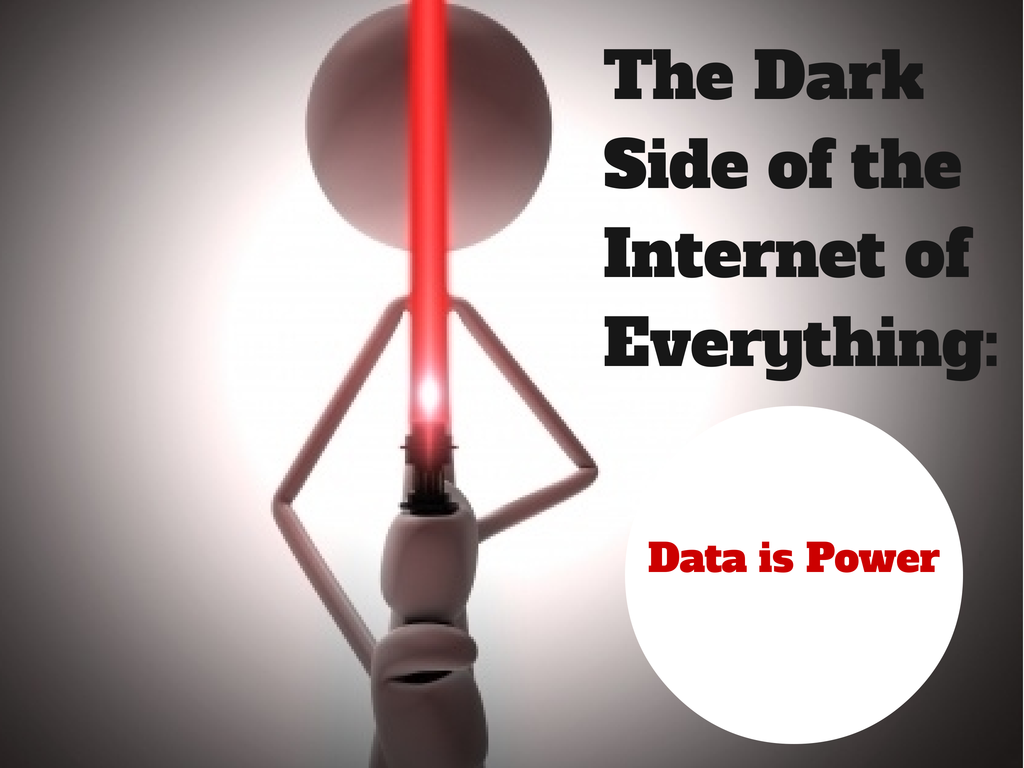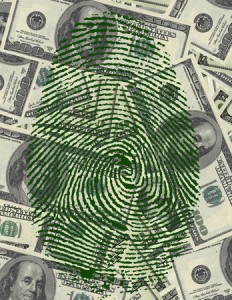
The Internet of Everything (IoE) is opening the door to a way of life that sounds like pure science fiction. Some wonderful things are coming. Soon our collective devices will be not only monitoring our bodies, but also tracking what’s going on in our cars and our homes… and controlling them from remote locations.
The coming era will be a new world where everything can be connected:
- All people across the globe.
- All objects (anything that we can attach a wifi chip to).
- All processes.
This will give us a quantum leap in knowledge and power – and generate a tremendous amount of data.
But what kind of “brave new world” will this be? A world where corporations control all our personal data, or a world where we have unprecedented individual empowerment?
In this post, we’ll look at the darker side of the “data is power” issue.
Data as the New Currency
 Our personal data is desirable to vast numbers of companies – and is worth a great deal of money.
Our personal data is desirable to vast numbers of companies – and is worth a great deal of money.
Companies Are Buying Your Personal Data
In a recent “60 Minutes” show, investigator Steve Kroft explains that data brokers are selling sensitive personal information about individuals as a commodity. Data brokers have been around for a while, but it’s different now, thanks to the ever-expanding Internet of Everything. Kroft says data brokering has changed because of the volume and the nature of the information being mined –it’s more personal and more pervasive.
“We’ve Lost Control of Our Personal Information”
Federal Trade commissioner Julie Brill says we’ve lost control of our most personal information. Companies are putting all the info together and making dossiers about individuals. She states,
“I think most people have no idea that it’s being collected and sold and that’s it’s personally identifiable about them and that the info is basically a profile about them.”
In an interesting side effect, retailers are finding a new source of income – one that is sometimes more lucrative than sales of their actual products or services: the sale of data about their customers.
New Data Dealer Game
For a quick-and-dirty understanding of this new phenomenon, watch the video below about the new Facebook game about collecting and selling personal user data. The game, called “Data Dealer” aims to capture the attention generated by this issue, and leads with this crude declaration: “Learn how to trick your users and make cash with their personal data!”
Why is Our Personal Data So Valuable?
More Intelligent Marketing
To put it bluntly, marketers want to know as much as they can about you – so they can sell you something. You can become the target of highly effective marketing when your personal information is an open book.
Perhaps the most sought-after information is your web browsing patterns, as that is highly likely to show what you are interested in, and what type of things you might buy.
Another popular set of personal information concerns your physical location throughout the day – your “geolocation data”
In the “60 Minutes” report, Steve Kroft found that one-dimensional lists are also used by marketers, and are widely available. These are lists of people with one particular quality in common. Some examples of lists available are:
- People who are desperate to get out of debt.
- People with gambling addictions.
- Patients who have had a sexually transmitted disease, psychiatric illnesses such as bipolar disorder or depression, or who have a genetic predisposition to cancer.
More Intelligent Decisions
Our personal data is also used by companies to make “informed” business decisions.
One demonstration of this is in the WFMY News North Carolina report exposing the fact that credit card companies are tracking your purchases and selling the information to insurance companies. The insurance companies say they don’t use the data to decide if you are insurable, or to change your rates. Their position is that they want the information so they can help their customers make better health choices.
Another example of our personal data is being used as businesses intelligence is in the arena of hiring. According to Tim Sparapani, legal consultant and expert in the field of data brokering, companies are buying extremely personal information on prospective employees.
Two Ways to Go: “Living in a Fishbowl” or “Every Individual Owns Their Own Data”
Janna Anderson, of the Imagining the Internet Center at Elon University, said recently at the Internet of Things Privacy Summit:
The privacy debate boils down to whether we as consumers are willing to surrender privacy for convenience, which is dangerous considering the tempting opportunity for the abuse of such private information.”
Basically, we’re at a crossroads. We’re looking at two opposing scenarios in terms of the rights to our personal information in the future:
- Once any personal data is “out there” the individual loses control over it.
Or …
- Every bit of personal data belongs to the individual, who makes all decisions on who can access it.
The first scenario above is the “path of least resistance”. And as you can see from the previous examples, we’re moving in that direction – more or less by default. Up until now, there have been no clearly defined data rights and data sharing protocols – so some questionable practices have arisen.
But many wise people are getting on the ball to change the tide and return the data rights to the proper owner: the individual.
Up Next: we’ll explore what thought leaders in the data privacy field are working on, and learn how we can join the movement towards individual data ownership.

Comments